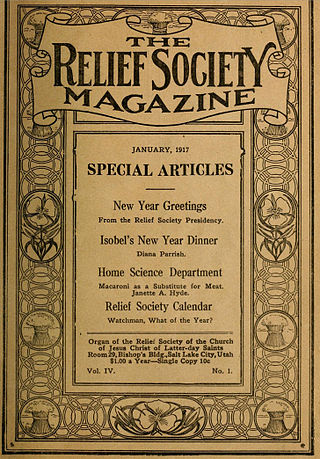
Relief Society Magazine was the official publication of the Relief Society of the Church of Jesus Christ of Latter-day Saints from 1915 to 1970. It succeeded the earlier and privately owned Woman's Exponent, which was begun in 1872. The magazine was an important publishing outlet for Utah women, and was run by women editors. The founding editor, Susa Young Gates, edited the magazine from 1915 to 1922. The December 1970 issue of the Relief Society Magazine was its last. The LDS Church discontinued the magazine as part of the implementation of the Priesthood Correlation Program. Thus, the magazine and several others within the church were replaced by the Ensign.
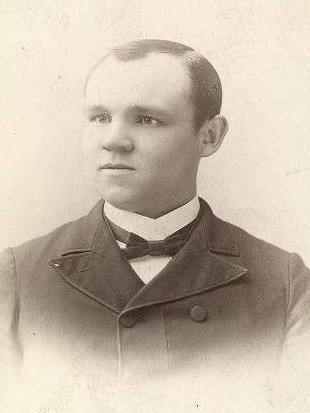
James Edward Talmage was an English chemist, geologist, and religious leader who served as a member of the Quorum of the Twelve Apostles of the Church of Jesus Christ of Latter-day Saints from 1911 until his death.

The Elders' Journal of the Church of Latter Day Saints was an early Latter Day Saint periodical edited by Don Carlos Smith, younger brother of Joseph Smith. It was the successor to the Latter Day Saints' Messenger and Advocate and was eventually replaced by the Times and Seasons.
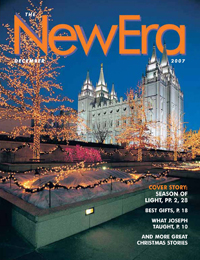
The New Era was an official magazine of the Church of Jesus Christ of Latter-day Saints from 1971 to 2020. First published in January 1971 along with the Ensign and the Friend, the New Era's intended audience was the church's youth. The magazine replaced the similarly themed The Improvement Era, a periodical published from 1897 to 1970.
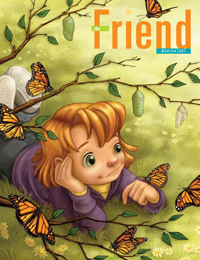
The Friend, formerly titled The Children's Friend, is a monthly children's magazine published by the Church of Jesus Christ of Latter-day Saints. It is aimed at those of Primary age, approximately ages 3 through 12. It includes messages from church leaders, stories, crafts, recipes, and artwork and poetry submitted by readers.
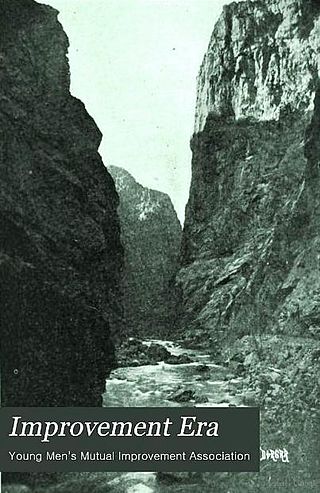
The Improvement Era was an official magazine of the Church of Jesus Christ of Latter-day Saints between 1897 and 1970.
The Young Women is a youth organization of the Church of Jesus Christ of Latter-day Saints. The purpose of the Young Women organization is to help each young woman "be worthy to make and keep sacred covenants and receive the ordinances of the temple."

Anstis Elmina Shepard Taylor was the first general president of what is today the Young Women organization of the Church of Jesus Christ of Latter-day Saints and was a founding member of the National Council of Women of the United States.

Ruth Fox was a 19th-century English-born American women's rights activist in the Territory of Utah. Fox was a poet, hymn writer, and a leader of youth in the Church of Jesus Christ of Latter-day Saints.

Martha Jane Tingey was the second general president of the Young Ladies' Mutual Improvement Association (YLMIA) of the Church of Jesus Christ of Latter-day Saints from 1905 to 1929. She spent a total of 49 years as a member of the general presidency.
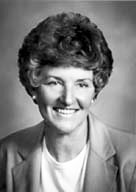
Elaine Anderson Cannon was the eighth general president of the Young Women organization of the Church of Jesus Christ of Latter-day Saints from 1978 to 1984. Cannon was a writer and an editor and the author of over fifty books.

Susa Gates was an American writer, periodical editor, president of the Daughters of Utah Pioneers, and women's rights advocate. She was a daughter of LDS Church president Brigham Young. Throughout her life, Gates wrote many short stories, novels, poems, and other literary works. According to R. Paul Cracroft's thesis, Gates wrote more than other Mormon writers. Gates was also actively involved in the Church of Jesus Christ of Latter-day Saints where, among other things, she wrote the lesson manuals, was a member of the Relief Society general board, lead genealogical efforts, and served as a missionary.

Louisa Lula Greene Richards was a poet and was the first female periodical editor in Utah Territory. Richards's work was published under a variety of names, including Louisa L. Greene, Louise L. Green, Lula Green, and Lula G. Richards. She was a member of the Church of Jesus Christ of Latter-day Saints.
The Deseret Museum was a museum in Salt Lake City, Utah.

Margaret Young Taylor was a member of the inaugural general presidency of the Young Ladies' National Mutual Improvement Association, now the Young Women organization of the Church of Jesus Christ of Latter-day Saints from 1880 to 1887. She was one of the plural wives of John Taylor, a president of the LDS Church.
Almira Mae Taylor Nystrom was a Utah suffragist and a member of the general presidency of what is today the Young Women organization of the Church of Jesus Christ of Latter-day Saints.

Jane Snyder Richards was a counselor to Zina D. H. Young in the general presidency of the Relief Society of the Church of Jesus Christ of Latter-day Saints from 1888 to 1901.
The Contributor was an independent publication associated with the Church of Jesus Christ of Latter-day Saints between 1879 and 1896. It was a monthly periodical and sought to represent the Young Men's and Young Ladies' Mutual Improvement Associations, the youth organizations of the LDS Church at the time. It was founded by Junius F. Wells, the inaugural head of the YMMIA.

Lelia ("Lillie") Tuckett Freeze was a leader in the Primary and Young Women organizations of the Church of Jesus Christ of Latter-day Saints.

Songs and Flowers of the Wasatch is a book of poetry edited by Emmeline B. Wells and illustrated by Edna Wells Sloan. Several copies, with hand-painted illustrations, were exhibited at the 1893 World's Columbian Exposition in the Women's Building Library and the Utah Building. Utah women poets wrote the book's thirty-four poems, which focused on Utah's landscape and Mormon theology. Reviews when the book came out focused on the book itself as an art object. Mormon historians see the book as Utah women's attempt to assimilate to cultural expectations of citizens of the United States of America.















